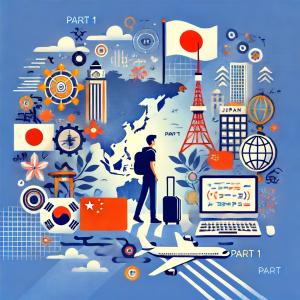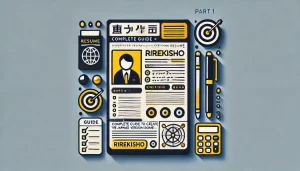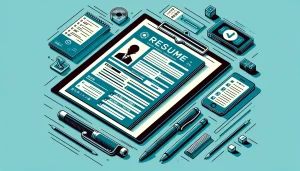1. Prepare a good video call environment
Creating an ideal video call environment is essential for making a great impression.
- Start by choosing a quiet, well-lit space free from distractions.
- Position your camera at eye level and ensure your background is tidy and professional.
- Use a reliable internet connection to avoid interruptions, and test your audio and video equipment with someone beforehand. make sure that the microphone does not pick up too much noise.
- Good lighting, such as natural light or a well-placed lamp, can enhance your appearance.
- Finally, minimize background noise by closing windows and doors, and mute notifications on your devices to maintain focus during the call. It is suprisingly obvious to see your eyes rolling away from the screen.
2. Be self-assured from the beginning
Consult with a professional about typical questions beforehand!
Apart from arriving early in order to compose yourself, you should have probably prepared some answers in advanced for questions that will most likely be asked. You should know that in Japan, you will be asked questions that you might not be asked in any other country. For example, here are some common questions an interviewer might ask you:
なぜ日本に来ましたか?(なぜにほんにきましたか
→ Why did you come to Japan/Why did you choose Japan?)
なぜ弊社に応募しましたか?(なぜへいしゃにおうぼしましたか
→ Why did you apply to our company?)
自己PRしてください。(じこPRしてください
→ Please “promote” yourself a.k.a tell us your specialities/abilities)
キャリアプランを教えてください。(きゃりあぷらんをおしえてください → Please tell us your career plan.)
Those are the question you will most likely get from the interviewer.
The “why did you come to Japan?” might be something that you’ve actually been asked countless times by the people you meet in Japan, but in job interview this is asked because they want to determine your likeliness to stay long-term (and be employed long-term) in Japan and you are not choosing Japan without understanding what it means to work in Japan as a member of the society.
The “why did you apply to our company“ is to check how knowledgeable you’re about the company you’re applying for and also to check if your motivation and work ethics are aligned with the company’s. When answering this part make sure your answer is cohearent with what you have written in your “志望動機” (shibou-douki), or based on the company’s vision, mission and roadmap.
In any case, depending on your answers to these questions, or what you wrote in the resume(s) that you have submitted, you will be asked follow-up questions so make sure all your answers are in line with the information you have shown in your resume and other screening documents.
In addition, there are things you need to be careful about when introducing yourself and doing (自己紹介) ji-ko-sho-kai, we will elaborate more about these points in future articles, so make sure to check them out. Also most Japanese companies appreciate those who always show the efforts to listen carefully or to take notes since it indicates a person who is keen to learn and organized so make sure to do it. Remember that this will be your first impression to the interviewers, so make sure to be calm and prepared.
3. Demonstrate Interview Manners
Arriving earlier to compose yourself
Perceptions surrounding time differ from culture to culture, and Japan literally worship punctuality. In Japan, “on-time” generally means that you should be at least 5 minutes earlier than the appointed time. So, make sure you arrive a little earlier for your interview, our recommendation is at least 15 minutes before the scheduled time.
Not even an earthquake can stop japanese people from being punctual
If you prepared for the interview beforehand by writing down a bunch of questions you think you might be asked, then take a look at those notes you made and review. Or, if that actually makes you more nervous, try to do something you usually do in your free time – something that relaxes or motivates you – Just make sure to keep an eye on the time.
Also note that while earlier is better, it might be best to not arrive or enter a call more than 10 minutes earlier, just because the interviewers might be occupied with preparation. They might feel forced to put their tasks to on hold in order to meet you because it is natural that people do not want to keep others waiting. This will unintentionally create an unpleasant mood, and staying in the place you’re scheduled to have an interview at might actually make you more nervous than usual.
Learn about the company and show how you will help the company grow
Similarly to preparing for the questions you’ll be asked, you should also research thoroughly about the company before the interview.
Don’t just read only the “about us” from the company’s homepage.
Do some research. Google is your best friend. Find out how the current employees describe about the company, the atmosphere and the culture – this would also help you in figuring out if that company is really the right one for you or not. In addition, in your preparation for the interview, feel free to add in the catch phrases they use to describe their values etc., but try not to over-do it.
Most importantly, research about the position you are interviewing for, and demonstrate your ability to think and solve the potential problems/issues that the team might be facing.
Don’t just recite your resume with what skills you have. Instead, demonstrate how you will add value to them, and how you will help the company grow in the future. Show some insightful ideas including what kind of support that you need from them to execute the plan, or why you think the project you’re planning is important and should be done.
In an interview, it is not the time to be humble. Take pride of what you have accomplished and in your own potential.
4. Turn the interview into a conversation
Focus on the main points you want to convey in a concise manner.
Think about why the interviewers are asking their questions — they mostly just want to get to know you and if you’re suited to their company, and the way they’ll get the most out of this is if you relax and do your best to give them the information they’re looking for. So, the best way to do this is to treat the interview as a normal conversation, with politeness of course.
Hence – don’t forget to smile, and make sure that when you’re talking, you’re talking clearly and loud enough and a a good pace for the interviewers to hear you. If you make a mistake with your Japanese, or whatever language you’re speaking in – don’t worry about it, correct yourself and move on. Be confident. Most of the times, your interviewers will only take note of those mistakes if you, yourself, make a show of them and start panicking – so try to relax, and your interviewers will feel relaxed as well.
Also remember that there are no wrong or right answers. If it’s a group interview, try not to compare yourself with the person beside you, and instead focus and feel confident in answering with your own personal experience as a base. It’s always someone that they feel good talking that gets the job.
Another good way to go into an interview, is to be prepared with questions to ask the interviewers. As for what kind of questions you should ask… well, what do you want to know?
For starters, asking things about the benefits you get (for example, maternity/paternity leave = 育児休暇 いくじきゅうか) could be good if you wanted information that you can’t get on the company’s website. It’s also fine to ask about salary, or about characteristics of the company that you’re not sure about (for example, the job that you will be doing or about certain systems in the company, like how to get promoted or if there even is a promotion system). BUT! remember, it is a give & take game, if you want to “take” more benefits from them, you need to be willing to “give” also.









What do you think? Leave Us a Comment!